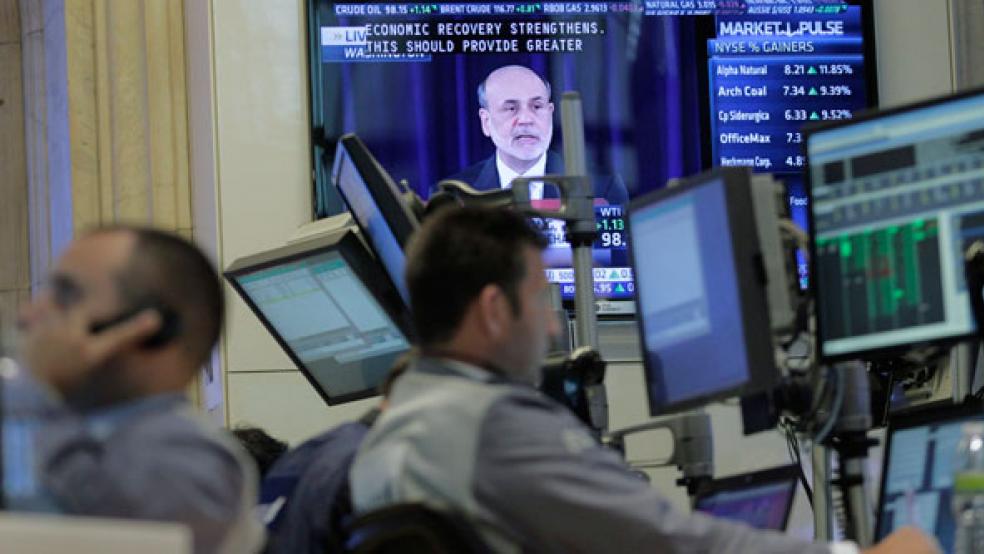Santa Claus Meets the Taper. OK, perhaps it’s not the most compelling title you could imagine for a season offering at your local multiplex, but the Fed’s idea to gently launch its tapering initiative following what has been a great year for investors won plaudits from that hard-to-please crowd.
Why is that, when the prospect of a taper had investors so rattled that key stock market indexes were being sold off only a week ago?
Baby Steps
Part of the answer lies in the nature of the Fed’s move. This is “taper lite”: The central bank announced a cut of only $10 billion, beginning in January, from its monthly $85 billion in purchases of long-term Treasury bonds and mortgage-backed securities. That’s a very modest start, and it sets up what is likely to be a lengthy and measured winding down of the monetary stimulus.
Related: Fed's New Top Dove Puts Job Growth First
At the same time, the announcement puts an end to the uncertainty that has hung over market participants since May, when Fed Chairman Ben Bernanke first warned that the central bank would pull back on its quantitative easing before too long. Tapering still won't be easy for the Fed policymakers, and the timing and nature of future reductions is as murky as ever. But the way that the first step was handled tells people that the process is underway – and that it’s likely to be carried out in baby steps.
Another reassuring part of the Fed’s announcement was the decision to couple the modest taper with more dovish language about short-term interest rates. For savers and bond market investors, of course, that isn’t going to be very welcome: Short-term rates and yields will remain at anorexic levels even as long-term rates may gradually edge higher, eroding the value of existing holdings. But anxious stock market investors likely will continue to draw comfort from the fact that tapering isn’t tightening – and that tightening is clearly further off in time than was previously the case.
It’s the Economy, Stupid
Most encouraging to investors, though, is the confidence the Fed is showing in continued economic progress. Clearly, the Fed is comfortable enough that even though inflation lingers below its 2 percent target rate, the economy is growing rapidly and sustainably enough to tolerate a withdrawal of at least some stimulus – as long as it’s done carefully, slowly and with time for all concerned to pause and digest the impact on both the economy and the markets.
The real impact won’t show up as rapidly as the fresh record highs for the Dow Jones industrial average and the S&P 500 might suggest. That was a knee-jerk response, and took place in the final full week of trading of the year, a period in which investors are looking for reasons to feel upbeat about markets that have been very generous.
After that holiday spirit wears off, both the Fed and Congress will still confront significant headwinds, which make it possible that the continuing enthusiasm for stocks could abate somewhat in the coming years, especially once investors have closed their books on 2013. There are some elements at work that are so unpredictable and unprecedented as to make this policymaking period particularly trying.
For starters, while unemployment levels have fallen slowly and joblessness now stands at 7 percent nationwide, few Americans believe that represents reality. The employment picture is radically different than at any other point in the Fed’s recent history, labor economists have argued.
Then there’s the fact that Congress is still failing to live up to its side of the deal. True, its members somehow managed to hammer out a narrow two-year deal on the budget. But Bernanke clearly remains frustrated with policies coming out of Washington as well as those that have failed to materialize. Fiscal policy, he noted at the press conference that followed the Fed’s announcement, continues “working in quite the opposite direction as monetary policy.”
Another Star in Bernanke’s Record
For all he’s done with monetary policy, Ben Bernanke’s legacy may be mixed when viewed through the rear-view mirror. True, he wisely helped the country avoid a second Great Depression, but he also failed to prevent the Great Recession from holding us in its grip. Moreover, when he leaves office it will be with more Americans unemployed than were jobless when he took on the post.
But if Bernanke is remembered for quantitative easing, among the other unconventional steps he took to save the economy and job creation, he should also be recognized for finally finding the right way to begin unwinding that program.
By now, the market has largely gotten any “taper tantrums” out of its system, and is ready to shift its attention away from the Fed and back to the data – which is just as it should be.
Top Reads from The Fiscal Times
- The Hidden Impact of Obamacare and the Economy
- Why Men and Women Still Can't Get Along at Work
- Obamacare—The Lump of Coal in America’s Stocking






